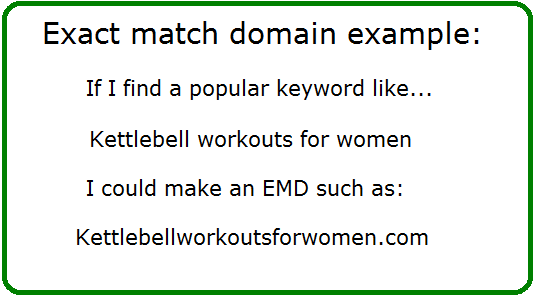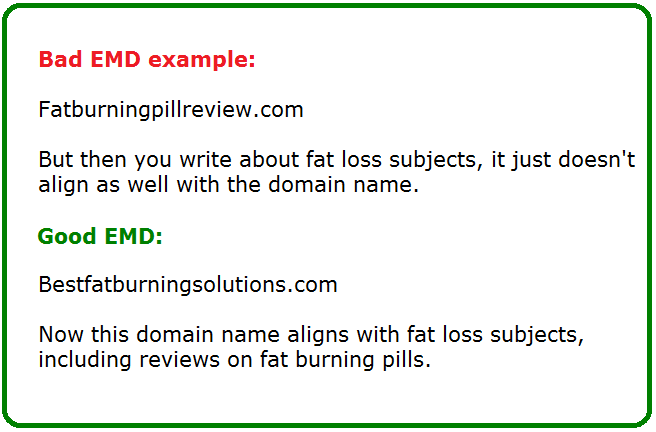Choosing a domain name that sounds awesome and is also great for SEO is tough, mainly because of all the myths you may have heard. So how do you decide?
Well, here’s a rule regarding picking out domain names (DN) I’ve been following for years:

I want to leave the comments section open for this, because I get a lot of questions from people who are undecided on what DN to pick, so if you’re still undecided after reading this whole article, let me know what ideas you are considering and I’ll help you make the choice.
That being said…
Contents
Here’s 5 rumors/myths about domain names (DN) and SEO we need to clear up:
1) I have to choose an EMD (Exact match domain).
In case this is the first time you’ve heard of an EMD, the basic premise of it is that you find a keyword with a large search volume, then make a DN that is literally that same keyword. For example:

As a result, it is believed that EMD’s rank higher on search engines, because the DN of the site matches a highly targeted keyword, so it gets extra weight for SEO.
Is this true?
Not exactly. Many years ago, YES, this was a real thing that indeed had positive SEO results for those who practiced it. But no longer. Let me explain why:
The SEO value a website has comes down to 100’s of different things, and it’s DN is honestly a minuscule part. It is so minuscule that…
If we took 2 people, who each made 1 site on the same subject, both targeted the same keyword, but one chose the EMD approach, while the other, chose something different, such as my approach, then in the beginning, the person with the EMD would rank higher, and that’s solely based on the fact that at first, both sites would be blank essentially, with no content on them and when Google would look at both sites, and see that they are blank, they’d give the EMD one a higher position over the other site because at least it has 1 of the many ranking factors.
But as soon as the person without the EMD starts adding content to his site and targets the same keyword, he will outrank the EMD site quite easily, so what I’m going back to is the main point about how little EMD’s matter in the long run.
So don’t worry about that awesome keyword you found with high search volumes, you can name your site pretty much anything, then just write an article on the site, with the meta title being that awesome keyword you found and you will get ranked for that, that’s really it.
In short, in my professional experience, don’t go the EMD route UNLESS all of the content and pages you write on the site are related to the DN. For example:

2) I have to buy an expired domain.
This is also a rumor with some merit to it, but there’s so little of it that there are far more cons to going this route. In short, this doesn’t work for SEO (reasons explained here).
The idea behind it is that domains overtime accrue favor ability from Google and if that domain gets sold and the buyer starts writing content on it, it will already have the SEO weight behind it to rank faster and higher.
That and the fact that many good sounding, and even brandable DN often get bought up and basically “ransomed” to the highest bidder makes them favorable too.
So is this true?
While in my opinion, there used to be truth to an expired domain holding higher SEO value than a new, fresh one, there are many domains which are sold by people that have a bad history with Google, such as perhaps, it was engaged in negative SEO and then, with that red mark, they are put up for sale without disclosing this, so the next buyer gets a tainted site basically, without knowing it.
My whole position on this is that it’s not worth worrying about buying that “perfect DN” or aged one, because it is almost impossible to know what was going on with it before you purchased it, and this SEO myth has been debunked as well.
I take the safe route here and advise not doing this.
3) I need to get a .com.
As website creation is growing in numbers, so too is the number of people buying up DN and it increasing at such a rapid pace that more and more “gTLD’s” are being released, which are basically domain extensions, beyond just .com’s. Here is an article on gTLDs from Wikipedia.
I will be completely honest here in saying that if you take 2 sites with the same exact subject, but one has a .com and the other has something unusual such as a .pro, that even something as uncommon as a .pro can outrank the .com if the content quality is of higher value on the .pro site than it is on the .com site.
Google itself has also released it’s official position on gTLD’s that you can read about here and they basically say the same thing.
However, while there is basically no SEO points awarded to a gTLD/a site’s extension, I will say that the content quality is what truly defines the site’s success for SEO, so while the message you could take from this is that you can go crazy and pick out whatever extension you want (it’s the right interpretation), my habit and advice would still be to chase the more known extensions, starting with a .com and then working your way down the extension ladder, with the next ones being a .net and then a .org.
I’m not a fan of the .pro, .guru or any other unknown or unpopular gTLD’s. As of this time, I would never make a site with those extensions, nor recommend that a client I am doing SEO work for would either, and that is because the people who view the site still inherently see the value a .com over the other, unknown extensions.
If you can’t get that awesome site title, be open minded enough to go for a completely different name. Do not waste too much time infatuated with one DN and nothing else, you can rank any site, for any keyword in the end, regardless of the DN, remember that.
4) I need it to be brandable.
The more serious you are about building a website for business purposes, even if it is a blog, the more brandable I would recommend you make your domain and also more simple sounding. What I mean by brandable is:

My website’s name, HelpingHandSEO.com is an example of these 4 principals in action.
If you can grow a website to a point where people can easily remember it’s name, they will eventually Google it and tell others about it, which will cause them to Google it too.
Eventually, you can create a brand out of the site, by having masses remember it and this can literally cause your site’s name to become a keyword. This is actually one of the goals I am aiming for with mine.
And ironically, that site may eventually become an EMD itself (because it’ll become a popular keyword on Google), but it’ll sound great, it’ll be original and it’ll be yours, which is a whole different dynamic that’s better. A person I know who sells SEO services, created a company that grew so much that people actually look for the company name on Google a lot.
Note: If you are not building your own brand, I would not recommend you pick a website name that uses another company’s brand name as it’s domain. This MAY cause trademark issues (it doesn’t often happen) and I would avoid that problem altogether by just picking something unique.
5) It needs to use my name.
You can go 50/50 here. If you are not famous or don’t have a large social media following or large following at all, then I would not do this. You first need to create a following, and lots of people need to know you and what you are all about before you create a DN that is literally your name.
Celebrities can do this, but if you aren’t one, I wouldn’t do it, especially if your name is hard to remember, go the other route first (with the 4 principals above), create a following, then decide if you want to start a new site, with your name being in the domain.
For example…
My full name is Vitaliy Gershfeld. I’m likely NOT going to make a DN anytime soon with my full name being that, because let’s be honest, who is going to remember that name, let alone how to spell it?
I’d rather build up my brand and my name THROUGH the website I currently run here (It’s so much easier to remember no?), and that will provide a better way for people to recognize it, as well as remember me, and who knows, perhaps sooner or later, if a big enough following pops up, I may just end up making a new DN with my name in it.
Ok, so when I’m ready, where should I buy my domain?
There’s tons of domain registrars to choose from but lately (actually for a few years), I’ve been buying mine from Wealthy Affiliate, as their deals are best.
Here is the official page and explanation of the benefits their registrar holds over the other places and like I said, nowadays, I buy all of my sites through them.
First you’d need to sign up with them for free, then you’d get the option to buy the site with all the benefits. The only other registrar I’ve dealt with before WA was GoDaddy.com, no longer though.
Hi Renton, your last sentence is the most important takeaway from all the other things you said in my opinion. And I would apply that tip on content on a fresh domain, vs an expired one.
I am currently working with exact match domains in terms of targeting a specific audience. I am worried about the current one I am using which is quite long. But I am writing good informative content for it. Do you avoid exact match domains that are to long or will good content make up for it?
Content will usually make up for it, and as long as the domain, even though it’s long, is easy to remember, I think you’re fine. How exactly long is this domain?
I think your main point is a very good one. The domain name should basically describe your site concisely and also be memorable. As for the brandable side it is hard to say what a good brand would sound like today with companies like Google and Yahoo being so big.
I think it is quite rare to find a domain name exactly matching your site (unless your niche is very unsaturated). That tip about expired domains is also good to know. It would be terrible to buy a great domain and then find out it is red flagged by Google.
I think quality content is always first prize at the end of the day.